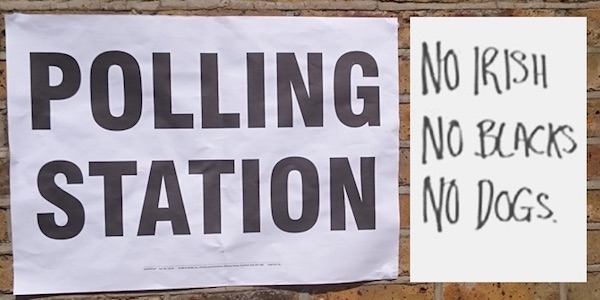
The British government has provoked anger after it said Irish citizens born in the north of Ireland cannot vote in a unity border poll or any other referendum under British law, and cannot have the same rights as other EU citizens.
Direct Ruler Karen Bradley blankly told the London parliament this week that Irish citizens living in the North of Ireland could not vote in any referendum.
Under current British legislation, voting rights of Irish and British people living in each other’s jurisdiction are reciprocal. Bradley claimed this only extends to local and parliamentary elections.
Her comments were apparently designed to address continuing confusion over the rights of EU citizens living in British jurisdiction, but only served to increase it. They followed a statement from the British government’s Home Office that Irish citizens born in the Six Counties will always be considered British, and therefore their rights as EU citizens would not be recognised.
The combination made for a shocking one-two punch to northern nationalists and their perceived status under the 1998 Good Friday Agreement.
Sinn Féin Deputy Leader Michelle O’Neill said: “Once again, the British Secretary of State has betrayed a staggering ignorance of the Good Friday Agreement which guarantees the rights of citizens, whether they identify as Irish, British or both.”
“The agreement clearly recognises ‘that it is for the people of the island of Ireland alone, by agreement between the two parts respectively and without external impediment, to exercise their right of self-determination on the basis of consent, freely and concurrently given, North and South, to bring about a united Ireland’.
“For Karen Bradley to suggest that Irish citizens would not be entitled to vote in a unity referendum is patently ridiculous.”
Ms O’Neill pointed out that thousands of Irish citizens voted in the Brexit referendum in the North, in 2016.
“Is she now saying that they did so illegally?” asked Ms O’Neill. “Her comments may be laughable but they are also typical of a wider disdain within her government for the Good Friday Agreement and the protections contained within it.
“At every stage of the Brexit process, they have sought to undermine the Good Friday Agreement and have recently declared their intention to treat everyone in the North as British citizens.
“That is entirely unacceptable. The British Government cannot and will not be allowed to redefine Irish citizenship or rewrite the Good Friday Agreement.”
Deputy Director of the Committee on the Administration of Justice Daniel Holder said: “The lack of any understanding of the GFA among the current government is getting beyond a joke.”
He said that the changes are not only incompatible with the Good Friday Agreement, but also Theresa May’s own Withdrawal Agreement with the EU>
This week’s statements have increased concerns that the weakened hull of the Good Friday Agreement will not withstand the pressures being exerted by Brexit. The political crisis is exposing the London government’s failure to take the GFA seriously, a legal expert has said.
Colin Harvey, a Queen’s University Belfast law professor, said that Irish citizens who are also considered British citizens will not be entitled to EU “settled status” after Brexit, and therefore could lose the right to be considered an EU citizen.
“There is little evidence thus far, including in the latest immigration rules, that the birthright provisions of the Good Friday agreement are being taken seriously,” said Prof Harvey.
“These latest rules confirm what we already know about the implementation gap that predates Brexit, but that Brexit is exposing.”
Emma DeSouza, a County Derry woman and Irish citizen fighting a labyrinthine appeals process for residency for her US-born husband, has argued that British citizenship is being imposed on the people of the north of Ireland.
She says they two tiers of Irish citizens are being created, those who can retain their EU rights and those who cannot. She questioned how London could justify opening the ‘settled status’ scheme for EU citizens differentially to Irish people based on their birthplace [south or north of the border].
“To me, that is the definition of second-class citizenship,” she said. She found it “extremely distressing” to see that she no longer met the definition of EU national, which has been used to deny her the right to live with her husband in the north of Ireland, a matter which is the subject of an ongoing court battle.
Una Boyd, a lawyer at the Committee on the Administration of Justice who previously represented Ms DeSouza, said the change in the definition underpinning eligibility in the EU settlement scheme was “not surprising” but that it was “disappointing”.
“There was an opportunity here for change to ensure the UK government fulfil the commitments under the withdrawal agreement and the Good Friday Agreement,” said Ms Boyd.
In Brussels, Sinn Féin MEP Martina Anderson described it as another “breach” of the Good Friday Agreement due to Brexit.
Ms O’Neill said the crude attempts by London to undermine or redefine the rights of Irish citizens were “reckless” would be rigorously opposed.
“The Good Friday Agreement, and the rights afforded by it, are international obligations,” said said. “They cannot be ignored or set aside.
She urged the Dublin government to defend the rights of Irish citizens as a co-guarantor of the peace deal. “This is not the first time London has sought to undermine the Good Friday Agreement to suit its own needs.”
![[Irish Republican News]](https://republican-news.org/graphics/title_gifs/rn.gif)
![[Irish Republican News]](https://republican-news.org/graphics/title_gifs/harp.gif)

